5. The path of logic moves step by step in a lineary (binary
→ true/false, black/white,
0/1) fashion. In contrast the living noise of the mosaic of life
has to be studied in daylight, multicoloured and in 2-dimensional
view:
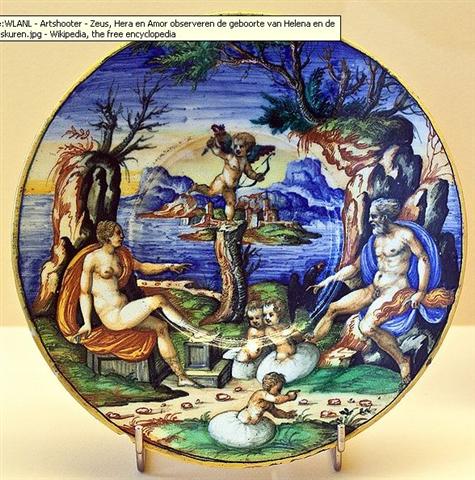
In both cases,
though, results which seem to be contradictory have to be looked
at again. Réculer pour mieux sauter. My method cannot be
to go ahead without looking back time and again. Any straight forward method will
always fail, the path has to be curved, enabling returns
to look again from some other new viewpoint. Thus my hyperlinks to
previous views are necessary and with time they will surely grow in
number. Anciently they had an easier task - simply relying on
internalized and often repeated memories:
... 'Most ingenious Thoth', said the god and
king Thamus, 'one man has the ability to beget arts, but the
ability to judge of their usefulness or harmfulness to their
users belongs to another; and now you, who are the father of
letters, have been led by your affection to ascribe to them a
power the opposite of that which they really possess. For this
invention will produce forgetfulness in the minds of those who
learn to use it, because they will not practise their memory.
Their trust in writing, produced by
external characters which are no part of themselves, will
discourage the use of their own memory within them. You have
invented an elixir not of memory, but of reminding; and you
offer your pupils the appearance of wisdom, not true wisdom, for
they will read many things without instruction and will
therefore seem to know many things, when they are for the most
part ignorant and hard to get along with, since
they are not wise, but only appear wise.' ...
... For the Maori the past is an important
and pervasive dimension of the present and future. Often
referred to as the 'ever-present now', Maori social reality is
perceived as though looking back in time from the past to the
present. The Maori word for 'the front of' is mua and
this is used as a term to describe the past, that is, Nga wa
o mua or the time in front of us. Likewise, the word for the
back is muri which is a term that is used for the future.
Thus the past is in front of us, it is known; the future is
behind us, unknown. The point of this is that our ancestors
always had their backs to the future with their eyes firmly on
the past. Our past is not conceived as something long ago and
done with, known only as an historical fact with no contemporary
relevance or meaning. In the words of a respected Maori elder:
The present is a combination of the ancestors and 'their living
faces' or genetic inheritors, that is the present generations.
Our past is as much the face of our present and future. They
live in us ... we live in them ...
... Space and time are a single, related
concept in Runasimi [the language of the Inca people],
represented by one word, pacha, which can also mean
'world' and 'universe'. The image of time familiar to Waman
Puma was static and spatial: one could travel in time as
one travels over earth - the structure, the geography, remaining
unchanged. To him it does not matter that he shows Inka Wayna
Qhapaq, who died in 1525, talking to Spaniards who did
not arrive until 1532. Wayna Qhapaq was the last Inca to
rule an undivided empire: he is therefore the archetype, and it
must be he who asks the Spaniards. 'Do you eat gold?' ...
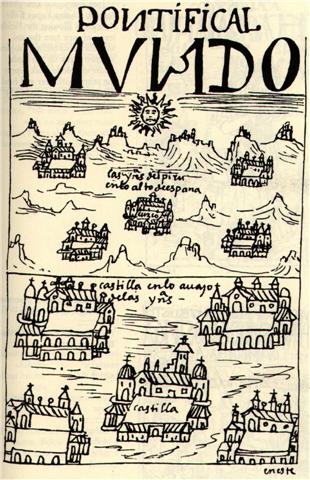
Once upon a time I was quite blown away by discovering how
Pachamama (the
perceived Earth Mother) clearly was self-repairing - like a string of DNA. She
was - or rather had been - a living entity:
... Thamus from the stern, looking toward the
land, said the words as he heard them: 'Great
Pan is dead'. Even before he had finished there was a great
cry of lamentation, not of one person, but of many, mingled with
exclamations of amazement. As many persons were on the vessel,
the story was soon spread abroad in Rome, and Thamus was sent
for by Tiberius Caesar. Tiberius became so convinced of the
truth of the story that he caused an inquiry and investigation
to be made about Pan; and the scholars, who were numerous at his
court, conjectured that he was the son born of Hermes and
Penelope ...
This became evident for me when I was
reading the immense work created by Gamkrelidze and Ivanov where they
compared the sets of phonemes from all available data regarding
the disparate yet related languages spoken in the multiple valleys in the Caucasian
mountain range. I should not have been surprised, though, because
languages are created from spoken images.
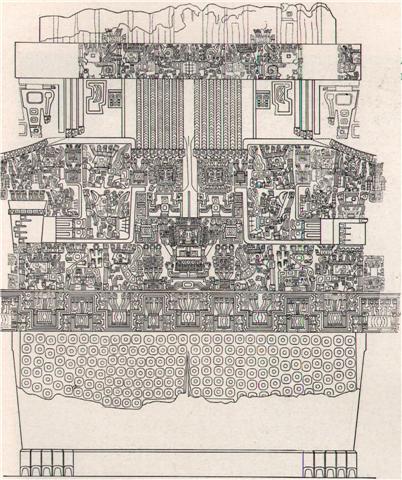
Looking at the documented fixed stars for support was not possible in daytime,
therefore my heliacal dates (according to the Gregorian
calendar) should here be transformed into the corresponding
dates at the Full Moon. Easter Island was too far south for the
Sun to be able to reach zenith.
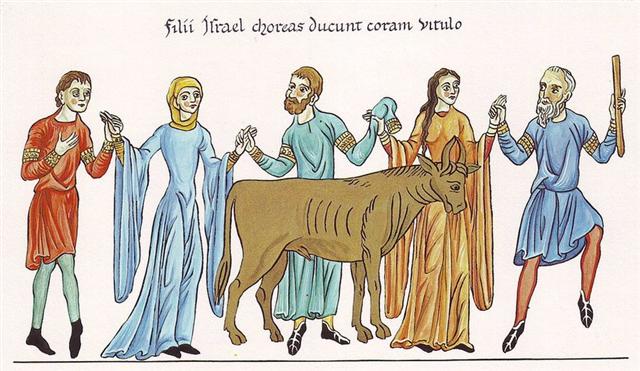
7 / 5 * 506 (Bb12-45)
= 361.4 (γ
Octantis) = 320.0 (Dramasa) + 41.4 (Bharani)
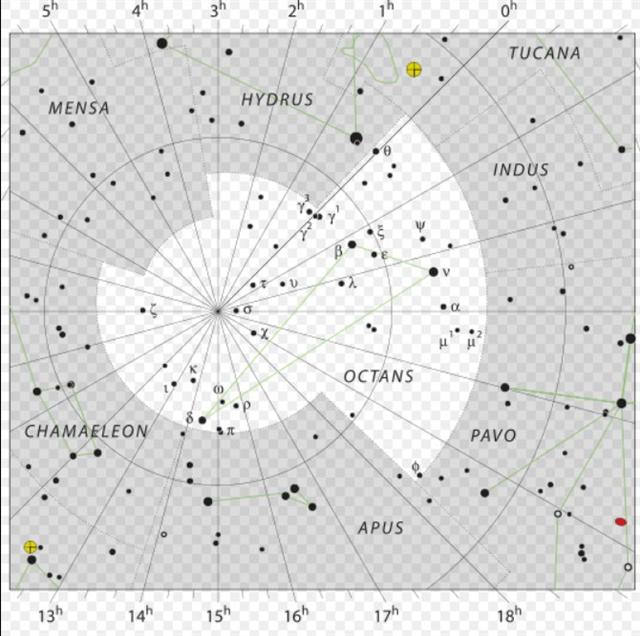
May 21 (506) + 2 = 508 → MARCH 20 →
"April 12 (*22) = "April 10 (100) + 2 = May 21 + 2:
|
Nov 21 (508 - 183 = 325) |
22 (80 + 246 = 326) |
 |
 |
|
Ea1-8 |
Ea1-9 |
| rere
te toki |
rere
ki hau tea - eko te toki |
|
Atea. The name of the district or
section of country over which Olopana is to have
ruled in Kahiki was in Hawaiian Moa-ula-nui-akea.
Analyzing this word, it consists of one appellative, Moa,
and three adjectives or epithets, ula, nui,
akea, 'red, great, open, or wide-spreading' ...
(Fornander) Pau.: fakaatea, to remove, to put away.
Ta.: atea, clear. Mq.: atea, id. Sa.:
ateatea, wide, spacious. Ma.: atea, clear.
Churchill.
Tea.
1. Light, fair, whitish. 2. To rise (of the moon,
the stars); ku-tea-á te hetu'u ahiahi, the
evening star has risen. Vanaga. 1. To shine, be bright,
brilliant, white; tea niho, enamel of the teeth;
ata tea, dawn; teatea, white, blond, pale,
colorless, invalid; rauoho teatea, red hair;
hakateatea, to blanch, to bleach. P Pau.: faatea,
to clear, to brighten. Mgv.: tea, white,
blanched, pale. Mq.: tea, white, clear, pure,
limpid. Ta.: tea, white, brilliant. 2. Proud,
vain, haughty, arrogance, to boast; tae tea,
humble; teatea, arrogant, bragging, pompous,
ostentatious, to boast, to show off, haughty;
hakateatea, to show off. Mgv.: akateatea,
pride, vanity, ostentatious, to be puffed up. Ta.:
teoteo, boastful, proud, haughty. 3. Mgv.: teatea,
heavy rain. Ha.: kea, the rain at Hana and
Koolau. Churchill. 1. White, clear;
fair-complexioned person, often favorites at court;
shiny, white mother-of-pearl shell, cfr. keakea,
kekea, Mauna Kea. Po'o kea, towhead,
gray-haired person. One kea, white sand (this is
shortened to ōkea or kea, as in the
expression kea pili mai, drift gravel -
vagabond). (PPN tea). 2. Breast milk. See
Nu'a-kea. 3. A variety of sugar cane, among
Hawaiians one of the best-known and most-used canes,
especially in medicine: clumps erect, dense, of medium
height; pith white. Ua ola ā 'ō kō kea, living
until kea cane tassels (until the hair turns
gray). 4. Name listed by Hillebrand for kolomona
(Mezoneuron kavaiense); see uhiuhi.
Wehewehe.
|
|
VISIBLE CLOSE TO THE FULL MOON: |
|
Al Dabarān-2 (The
Follower)
HYADUM I =
γ
Tauri (63.4)
*22.0 = *63.4 - *41.4 |
HYADUM II = δ¹ Tauri
(64.2) |
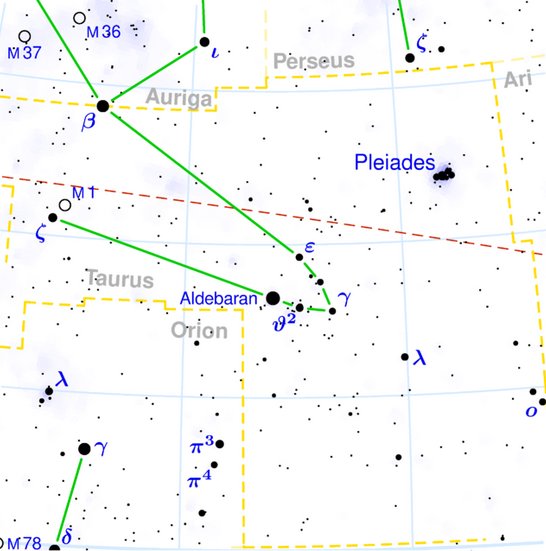 |
|
May 23 (508 = 444 + 64 =
*63) |
24 (*64 = 144 - 80) |
|
'April 26 (481 = 508 -
27) |
27 (*37 = *64 - *27) |
|
"April 12 (*22) |
13 (144 - 41 = 103) |
|
MARCH 20 (*364 = 444 -
80) |
21 (80 = 144 - 64) |
To repeat:
|
Nov 14
(318) |
15 (137 +
182) |
16 (320) |
17 (504 -
183) |
Nov 18 (322) |
|
VISIBLE CLOSE
TO THE FULL MOON: |
|
Hairy Head-18
(Cockerel)
/
Temennu-3 (Foundation
Stone)
ALCYONE
(56.1),
PLEIONE (28 Tauri), ATLAS (27 Tauri)
(56.3) |
MENKHIB (Next to the Pleiades =
ζ
Persei
(57.6)
PORRIMA (γ
Virginis) |
ZAURAK (Boat) = γ Eridani
(58.9) |
λ Tauri (59.3), ν Tauri (59.9) |
4h (60.9)
JĪSHUĬ = λ Persei (60.7)
COR CAROLI (α Canum Ven.) |
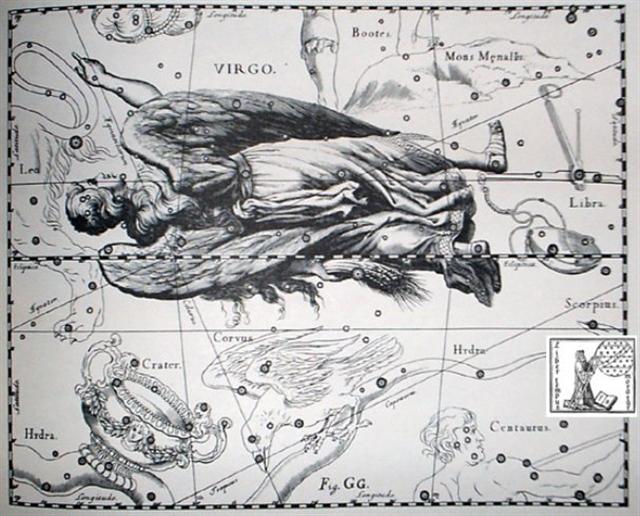 |
|
May 16
(501) |
17 |
18 (74 + 64) |
19 (139) |
20 (20
weeks) |
|
'April 19 |
20 |
21 (111) |
22 (139 -
27) |
23 |
|
"April 5 |
6 |
7 (88 = 74
+ 14) |
8 |
9 (99 =
140 - 41) |
|
MARCH 13 |
14 → 3-14 |
15 (74) |
16 |
17 |
 |
 |
 |
 |
 |
|
Ea1-1 |
Ea1-2 |
Ea1-3 |
Ea1-4 |
Ea1-5 |
|
E
hakamata hia tu mai tae vahu ku huku
hia te vaha
ko te tagata - kua mau ki te
hukiga |
|
Va.
1. Hakava, judge, judgement. T Mgv.: akava, to
judge, to pass sentence. Pau.: haava, to judge, to
conjecture. Ma.: whakawa, to charge with crime, to
condemn. Ta.: haava, to judge. 2. Hakava, to
speak. P Mgv.: va, to speak. Mq.: vaa, to chatter
like a magpie. The Marquesan retains more of the primal sense
although the simile is an alien importation. In Samoa va
means a noise, in Tonga va is a laughing noise, in Futuna
va is the disorderly cry of tumult, and probably it is
the initial element of Viti wa-borabora to speak quickly
and confusedly as when scolding. Its only identification in
Tongafiti territory is Hawaii wawa the confused noise of
a tumult ... Churchill. Ta.: va, space between the leaves
in a roof. Sa.: va, space between. Ma.: wa,
interval. Churchill.
Hu. 1. Breaking of wind. T Mgv., uu,
to break wind. Mq., Ta.: hu, id. 2. Whistling of the
wind, to blow, tempest, high wind. P Pau.: huga, a
hurricane. Churchill. Mgv.: hu, to burst, to crackle, to
snap. Ha.: hu, a noise. Churchill.
Ha. 1. Four. 2. To breathe. Hakaha'a,
to flay, to skin. Vanaga. 1. Four. P Mgv., Mq.,
Ta.: ha, id. 2. To yawn, to gape. 3. To heat. 4.
Hakaha, to skin, to flay; unahi hakaha, to scale
fish. Mgv.: akaha, to take to pieces, to take off the
bark or skin, to strip the leaves off sugarcane. 5. Mgv: ha,
sacred, prohibited. Mq.: a, a sacred spot. Sa.: sa,
id. Churchill.
Vaha.
Hollow; opening; space between the fingers (vaha rima);
door cracks (vaha papare). Vahavaha, to fight, to
wrangle, to argue with abusive words. Vanaga. 1. Space, before
T; vaha takitua, perineum. PS Mgv.: vaha, a space,
an open place. Mq.: vaha, separated, not joined. Ta.:
vaha, an opening. Sa.: vasa, space, interval. To.:
vaha, vahaa, id. Fu.: vasa, vāsaà,
id. Niuē: vahā. 2.
Muscle, tendon; vahavaha,
id. Vahahora (vaha
1 - hora 2), spring.
Vahatoga (vaha
1 - toga 1), autumn.
3. Ta.: vahavaha, to
disdain, to dislike. Ha.: wahawaha,
to hate, to dislike. Churchill.Vaha.
Hollow; opening; space between the fingers (vaha
rima); door cracks (vaha papare). Vahavaha, to
fight, to wrangle, to argue with abusive words. Vanaga. 1.
Space, before T; vaha takitua, perineum. PS Mgv.: vaha,
a space, an open place. Mq.: vaha, separated, not joined.
Ta.: vaha, an opening. Sa.: vasa, space, interval.
To.: vaha, vahaa, id. Fu.: vasa, vāsaà,
id. Niuē: vahā. 2.
Muscle, tendon; vahavaha,
id. Vahahora (vaha
1 - hora 2), spring.
Vahatoga (vaha
1 - toga 1), autumn.
3. Ta.: vahavaha, to
disdain, to dislike. Ha.: wahawaha,
to hate, to dislike. Churchill. |
|
→ INVISIBLY CLOSE TO THE SUN: |
|
π
Cor. Borealis,
UNUK ELHAIA (Necks of the Serpents) =
λ
Serpentis
(238.1),
CHOW =
β
Serpentis
(238.6) |
κ
Serpentis (239.3),
δ
Cor. Borealis,
TIĀNRŪ =
μ
Serpentis
(239.5),
χ
Lupi, (239.6),
ω
Serpentis (239.7),
BA (= Pa) =
ε
Serpentis,
χ
Herculis (239.8).
κ
Cor.
Borealis, ρ Serpentis (239.9) |
λ
Librae (240.0),
β
Tr. Austr. (240.3),
κ
Tr. Austr. (240.4),
ρ
Scorpii (240.8)
*199.0 = *240.4 - *41.4 |
Iklīl al Jabhah-15
(Crown of the Forehead)
/
Anuradha-17
(Following Rādhā)
/
Room-4 (Hare)
ξ
Lupi,
λ
Cor. Bor.(241.1),
ZHENG =
γ
Serpentis,
θ
Librae (241.2),
VRISCHIKA =
π
Scorpii
(241.3),
ε
Cor.
Borealis (241.5),
DSCHUBBA
(Front of Forehead) = δ Scorpii
(241.7), η Lupi (241.9) |
υ
Herculis (242.3),
ρ
Cor. Borealis (242.4),
ι
Cor. Borealis (242.5),
θ
Draconis (242.6),
ξ
Scorpii (242.7)
SCHEDIR
(Breast) α Cassiopeiae
*201.0 = *242.4 - *41.4 |
... In the morning of the world, there was
nothing but water. The Loon was calling, and the old man who at
that time bore the Raven's name, Nangkilstlas, asked her
why. 'The gods are homeless', the Loon replied. 'I'll see to
it', said the old man, without moving from the fire in his house
on the floor of the sea. Then as the old man continued to lie by
his fire, the Raven flew over the sea. The clouds broke. He flew
upward, drove his beak into the sky and scrambled over the rim
to the upper world. There he discovered a town, and in one of
the houses a woman had just given birth. The Raven stole the
skin and form of the newborn child. Then he began to cry for
solid food, but he was offered only mother's milk [→
Schedir] That night, he passed through
the town stealing an eye from each inhabitant. Back in his
foster parents' house, he roasted the eyes in the coals and ate
them, laughing. Then he returned to his cradle, full and warm.
He had not seen the old woman watching him from the corner - the
one who never slept and who never moved because she was stone
from the waist down. Next morning, amid the wailing that
engulfed the town, she told what she had seen. The one-eyed
people of the sky dressed in their dancing clothes, paddled the
child out to mid-heaven in their canoe and pitched him over the
side ...
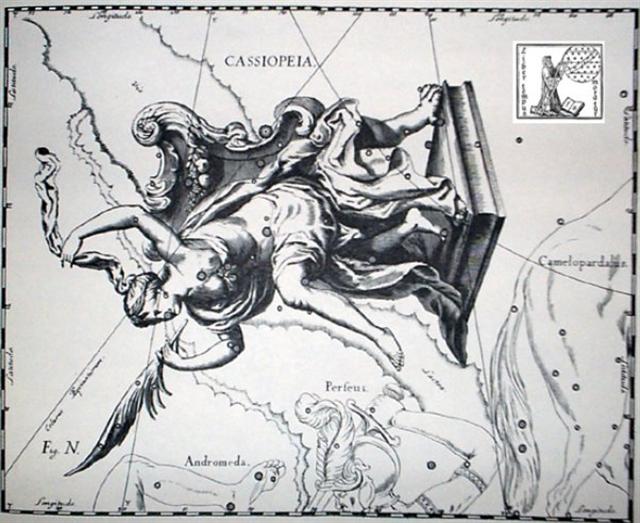
November 18 according to statements on Hawaii:
... The correspondence between the winter solstice and the
kali'i rite of the Makahiki is arrived at as follows:
ideally, the second ceremony of 'breaking the coconut', when the
priests assemble at the temple to spot the rising of the
Pleiades, coincides with the full moon (Hua tapu) of the
twelfth lunar month (Welehu). In the latter eighteenth
century, the Pleiades appear at sunset on
18 November. Ten days
later (28 November), the Lono effigy sets off on its
circuit, which lasts twenty-three days, thus bringing the god
back for the climactic battle with the king on 21 December, the
solstice (= Hawaiian 16 Makali'i). The correspondence is
'ideal' and only rarely achieved, since it depends on the
coincidence of the full moon and the crepuscular rising of the
Pleiades ...
|
Nov 19 |
20 (324) |
|
VISIBLE CLOSE TO THE FULL MOON: |
|
υ Persei (61.2) |
BEID (Egg) =
ο¹
Eridani
(62.2),
μ
Persei (62.8)
VINDEMIATRIX ( ε Virginis) |
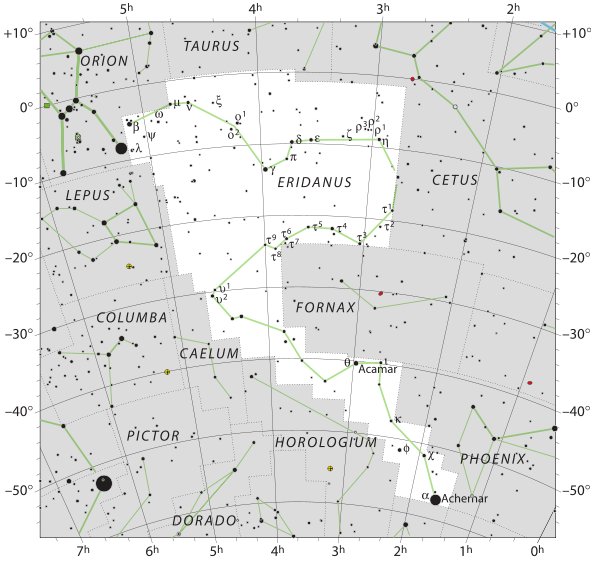 |
|
May 21 (365 + 141 = 506) |
22 (*62) |
|
'April 24 (506 - 27 =
479) |
25 (*35
= 115 - 80) |
|
"April 10 (100) |
11
(*21) |
|
MARCH 18 (442) |
19 (78) |
 |
 |
|
Ea1-6 |
Ea1-7 |
| rere
te toki rere ki uta |
rere
ki te vao |
|
Uta.
Higher up (from the coast, or from another place); i
uta era, further up, up there; ki î te îka i uta,
as there are lots of fish on the beach. Vanaga. 1. Inland,
landward; paepae ki uta, to strand, to run aground;
mouku uta, herbage. 2. To carry; uta mai, to
import; hakauta, to give passage. Campbell.
Vao.
Mgv.: vao, uninhabited land. Ta.: ? [obliterated
text] ... of the valleys. Mq.: vao, bottom of a
valley. Sa.: vao, the bush. Ma.: wao, the
forest. Churchill.
Honui. 1. Person worthy of respect, person of
authority. 2. Livelihood, heirloom, capital;
ka moe koe ki toou hônui, you must marry to ensure
your livelihood (said to a little girl); he hônui mo
taaku poki, this is the heirloom for my son. Vanaga.
Great (hoonui); honui, chief T.; tagata
hoonui, personage; hakahonui, to praise, to
commend. Churchill.
Toki.
Small basalt axe. Vanaga. Stone adze. Van Tilburg.
Ha'amoe ra'a toki = 'Put the adze to sleep' (i.e. hide
it in the temple during the night). Barthel. Month of the
ancient Rapanui calendar. Fedorova according to
Fischer. To'i. T. Stone adze (e to'i purepure
= with the wounderful adze). Henry. The Araukan Indians in
the coastal area of northern Chile, have customs similar to
those on the Marquesas and in both areas toki means
adze according to José Imbelloni. The Araukans also called
their chief of war toki and the ceremonial adze
symbolized his function and was exhibited at the outbreak of
war. In Polynesia Toki was the name of a chief
elevated by the Gods and his sign was the blade of a toki.
Fraser. Axe, stone hatchet, stone tool ...; maea toki,
hard slates, black, red, and gray, used for axes T. P Pau.:
toki, to strike, the edge of tools, an iron hatchet.
Mgv.: toki, an adze. Mq.: toki, axe, hatchet.
Ta.: toi, axe. Churchill. A Maori saying: he iti
toki, e rite ana ki te tangata = though the adze be
small, yet does it equal a man. (Starzecka) |
|
→
INVISIBLY CLOSE TO THE
SUN: |
|
16h (243.5)
ACRAB (Scorpion) = β Scorpii,
JABHAT AL ACRAB (Forehead of the Scorpion) = ω Scorpii
(243.3), θ Lupi,
RUTILICUS = β Herculis
(243.5),
MARFIK (Elbow) = κ Herculis
(243.7), φ Herculis (243.8) |
ψ
Scorpii (244.6),
LESATH (Sting) =
ν
Scorpii
(244.8) |
... should we not rather guess the day for the beginning of the
month of Toki was the proper equinox date in time-space,
viz MARCH 20 (79)? Counting the eggs of birds (high up above
the road of the Spider)
and the eggs of fishes (far down below the way to the
Sky-Father) the proper measure surely ought to be 20 (the score
for counting something round) ...
|
Nov 21 (508 - 183
= 325 → 322 + 3) |
→
22 (80 + 246 = 326) |
|
... In China, every year
about the beginning of April, certain officials called
Sz'hüen used of old to go about the country armed with
wooden clappers. Their
business was to summon the people and
command them to put out every fire. This was the beginning
of the season called Han-shih-tsieh, or 'eating of
cold food' ... |
|
VISIBLE CLOSE TO THE FULL MOON: |
|
Al Dabarān-2 (The
Follower)
HYADUM I =
γ
Tauri (63.4)
*22.0 = *63.4 - *41.4 |
HYADUM II = δ¹ Tauri
(64.2) |
 |
|
May 23 (508 = 444 + 64 =
*63) |
24 (*64 = 144 - 80) |
|
'April 26 (481 = 508 -
27) |
27 (*37 = *64 - *27) |
|
"April 12 (*22) |
13 (144 - 41 = 103) |
|
MARCH 20 (*364 = 444 -
80) |
21 (80 = 144 - 64) |
 |
 |
|
Ea1-8 |
Ea1-9 |
| rere
te toki |
rere
ki hau tea - eko te toki |
|
Atea. The name of the district or
section of country over which Olopana is to have
ruled in Kahiki was in Hawaiian
Moa-ula-nui-akea. Analyzing this word, it consists
of one appellative, Moa, and three adjectives or
epithets, ula, nui, akea, 'red,
great, open, or wide-spreading' ... (Fornander) Pau.:
fakaatea, to remove, to put away. Ta.: atea,
clear. Mq.: atea, id. Sa.: ateatea, wide,
spacious. Ma.: atea, clear. Churchill.
Tea.
1. Light, fair, whitish. 2. To rise (of
the moon, the stars); ku-tea-á te hetu'u ahiahi,
the evening star has risen. Vanaga. 1. To shine,
be bright, brilliant, white; tea niho, enamel
of the teeth; ata tea, dawn; teatea,
white, blond, pale, colorless, invalid; rauoho
teatea, red hair; hakateatea, to blanch,
to bleach. P Pau.: faatea, to clear, to
brighten. Mgv.: tea, white, blanched, pale.
Mq.: tea, white, clear, pure, limpid. Ta.:
tea, white, brilliant. 2. Proud, vain, haughty,
arrogance, to boast; tae tea, humble;
teatea, arrogant, bragging, pompous,
ostentatious, to boast, to show off, haughty;
hakateatea, to show off. Mgv.: akateatea,
pride, vanity, ostentatious, to be puffed up. Ta.:
teoteo, boastful, proud, haughty. 3. Mgv.:
teatea, heavy rain. Ha.: kea, the rain at
Hana and Koolau. Churchill. 1. White,
clear; fair-complexioned person, often favorites at
court; shiny, white mother-of-pearl shell, cfr.
keakea, kekea, Mauna Kea. Po'o
kea, towhead, gray-haired person. One kea,
white sand (this is shortened to ōkea or
kea, as in the expression kea pili mai,
drift gravel - vagabond). (PPN tea). 2.
Breast milk. See Nu'a-kea. 3. A variety of
sugar cane, among Hawaiians one of the best-known
and most-used canes, especially in medicine: clumps
erect, dense, of medium height; pith white. Ua
ola ā 'ō kō kea, living until kea cane
tassels (until the hair turns gray). 4. Name listed
by Hillebrand for kolomona (Mezoneuron
kavaiense); see uhiuhi. Wehewehe.
|
|
→
INVISIBLY CLOSE TO THE
SUN: |
|
χ
Scorpii (245.1),
YED PRIOR (Hand in Front) =
δ
Ophiuchi,
δ
Tr.
Austr. (245.5) |
YED POSTERIOR (Hand Behind) =
ε
Ophiuchi,
RUKBALGETHI SHEMALI (Northern Knee of the Giant) =
τ
Herculis
(246.6).
δ
Apodis (246.7),
ο
Scorpii (246.8) |
This is not the military chain of command 'Repeat!', which is
used in order to ascertain the chain of obedience holds
together, leaving no room for changes. No life there, and it should
be depicted as Still-leben ('not moving yet Still
Alive').

|
















